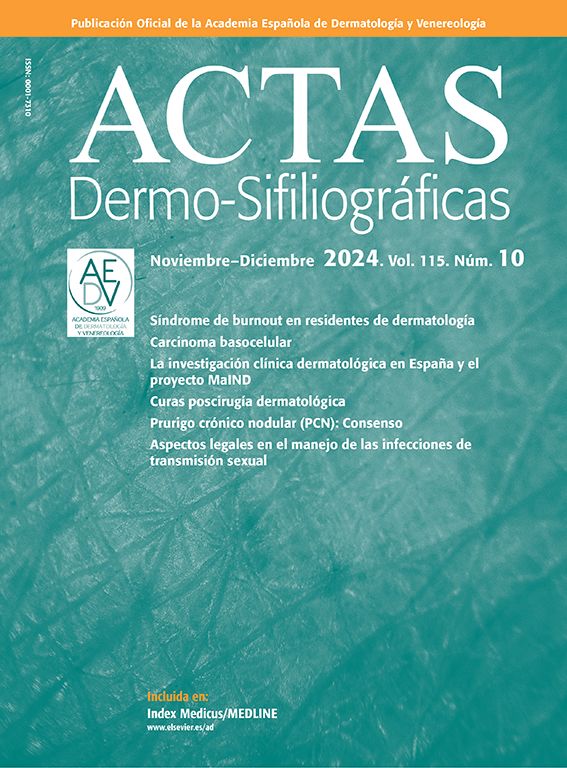Systemic sclerosis is a multisystem disease characterized by skin sclerosis and fibrosis of internal organs secondary to microvascular damage. Diagnosis is often delayed, resulting in advanced disease and organ dysfunction.1 Diffuse depigmentation in a salt and pepper pattern can help in the early diagnosis of certain cases.2 This sign, however, can often be overlooked or confused with other types of dyschromia such as vitiligo.
The salt and pepper sign is a dyschromia associated with progressive systemic sclerosis. It is characterized by vitiligo-like depigmentation with perifollicular pigmentary retention, as the periadnexal capillary network preserves melanogenesis (Fig. 1).2 This sign is one of the earliest and most frequent findings in progressive systemic sclerosis in patients with Fitzpatrick skin types IV, V, or VI, and it may sometimes be the only manifestation in patients without cutaneous sclerosis plaques (systemic sclerosis sine scleroderma).3,4 Pigmentary changes in scleroderma have been identified as an early manifestation of systemic damage in up to 30% of patients; most of these patients have pulmonary involvement due to interstitial fibrosis and pulmonary hypertension, which is usually the main cause of mortality.2,5 The lesions are most often located on the head (forehead, scalp, and retroauricular region), followed by the neck and the dorsum of the fingers.3 Histologic findings of sclerosis in areas of dyschromia are inconsistent, while signs of follicular fibrosis are rare. Other findings are similar to those seen in vitiligo: pigmentary incontinence, a periadnexal lymphocytic infiltrate, and absence of melanocytes at the periphery of the follicle. Biopsy findings in salt and pepper areas are therefore not diagnostic.6
The clinical and dermoscopic characteristics of 4 patients with systemic sclerosis and salt and pepper skin are shown in Table 1. A whitish perifollicular halo was seen on dermoscopy in all cases. All the patients met the 2013 diagnostic criteria for progressive systemic sclerosis according to the American College of Rheumatology/European League Against Rheumatism, and they all had lung involvement in imaging studies. Based on these findings, they were referred to the rheumatology department, where they were treated with mycophenolate and systemic corticosteroids.
Clinical and Dermoscopic Characteristics in Patients With Progressive Systemic Sclerosis and Salt and Pepper Skin.
| Sex/age, y | Location | Other cutaneous signs of scleroderma | Previous diagnosis | Dermoscopic findings | Systemic findings |
|---|---|---|---|---|---|
| F/38 | Chest (intermammary cleft) | SclerodactylyMorphea plaques on dorsal aspect of forearms | Vitiligo | Perifollicular pigmentation with a whitish halo and a white area with a pseudo perifollicular network surrounding a milky red area | Pulmonary fibrosis: Bilateral patchy, ground glass pattern |
| F/48 | Cheeks | None | Melasma and confetti-like depigmentation due to hydroquinone | Whitish perifollicular halo surrounded by a pseudo pigment network | Interstitial pulmonary fibrosis |
| F/64 | Forehead (frontal hairline) | Sclerosis plaques on thighsLipodermatosclerosis on right leg | Vitiligo | Whitish perifollicular halo surrounded by a pseudo pigment network | Pulmonary fibrosis |
| F/42 | Back, midline | None | Friction melanosis | Whitish perifollicular halo surrounded by a pseudo pigment network | Pulmonary fibrosis |
Abbreviation: F, female.
Because the salt and pepper sign shares clinical features (visible to the naked eye and under Wood's lamp) and histologic and pathophysiologic characteristics with vitiligo, it is usually diagnosed late, and is often confused with follicular repigmentation in vitiligo. Patients with a delayed diagnosis develop progressive systemic disease, including vascular disease, interstitial lung fibrosis, myocarditis, acute renal failure, lower esophageal incompetence, and arthritis.2 More effective techniques (such as dermoscopy) are therefore required for early diagnosis. In patients with vitiligo, dermoscopy shows a pseudo pigment network with ill-defined borders in areas of follicular repigmentation (Fig. 2).7 All 4 patients whose details are shown in Table 1 had a whitish perifollicular halo on dermoscopy (Fig. 3). This halo could be a hallmark sign that might be clinically helpful in distinguishing between salt and pepper skin in progressive systemic sclerosis and repigmentation around the hair follicles in vitiligo. Its recognition could therefore help accelerate the diagnosis of severe sclerosis and systemic involvement (mainly pulmonary). The salt and pepper sign might correspond to early perifollicular fibrosis, similar to that seen in lichen planopilaris. Our findings confirm the usefulness of dermoscopy in clinical dermatology.
Dermoscopic features of dyschromia in salt and pepper skin. A, Accentuated pigment network surrounding a whitish perifollicular circle against an achromic background. B, Accentuated pigment network surrounding a uniform whitish perifollicular halo against white areas with telangiectasias.
The authors declare that they have no conflict of interest.











